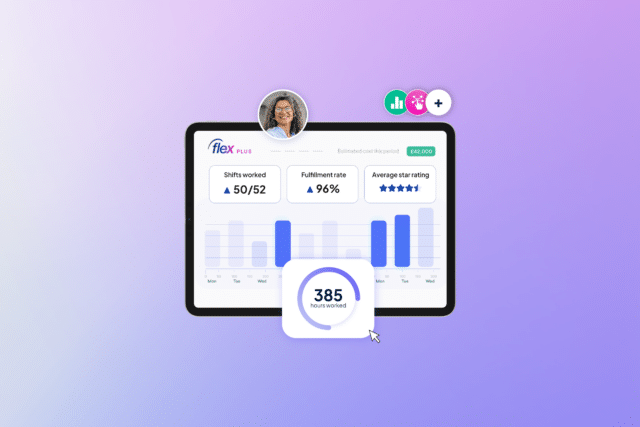
Vendor management systems (VMS) are a type of software that can offer many benefits to businesses that employ contingent staff, as well as the agencies that direct these temporary employees to them. While implementing new technology at your business can seem like a hassle, it can be worth it if the benefits outweigh the costs. VMS can offer a wide range of significant benefits to businesses, and staffing suppliers in particular.
What is a vendor management system?
Vendor management systems (VMS) are a type of software that document and manage the employment life cycle of contingent employees. These systems centralize this information and allow for easy navigation of data. They also provide a shared platform where businesses and vendors can more efficiently communicate.
Here are some of the other significant benefits VMS can provide staffing suppliers:
1. Integration and communication
VMS provide communication channels, such as instant messaging, to improve communications between businesses and staffing suppliers. A fast, dedicated channel of communication is valuable because it removes the guesswork when deciding how to best reach out. Further, by providing a central communication hub, the system effectively integrates many shared processes between businesses and staffing suppliers for referrals, onboarding processes, and employee management.
2. Transparency and visualization
Vendor management systems collect and analyze data related to the entirety of contingent workers’ employment life cycles. This information is then stored conveniently in one place, where it can be analyzed to glean various valuable insights.
Additionally, VMS can visualize this data for easier analysis. This feature also improves transparency, as interested parties can gain insights into elements of the employment life cycle that they are not directly involved in.
3. Regulatory compliance
VMS are also programmed to account for legal parameters in their management processes. Many laws pertain to employment, and they can be difficult to navigate unassisted. As such, an automated system can provide many benefits regarding compliance. The data on employment life cycles that VMS gathers can help organizations identify and correct compliance failures early on.
4. Centralization
Perhaps the biggest benefit of VMS is how they centralize many processes in one place. Communication, data analysis, invoicing, and more can all be handled on a single platform. Centralization is particularly useful for maintaining relationships between businesses and staffing suppliers, as there may be degrees of overlap between many different organizations for widely varying periods. This can be very challenging to juggle without a centralized hub to keep track of and manage all of these relationships.
5. Performance monitoring
VMS collects many different types of data from every phase of the employment life cycle for contingent employees. This data can be used to monitor the performance of contingent employees and gain insights into how individuals are doing, as well as greater trends in employee behaviors.
It can even be used to identify very specific ways in which employees are meeting or falling short of expectations, which can be valuable information for letting organizations know how training or procedures need to be adjusted.
These adjustments can be implemented in a variety of ways, from improving training standards to adjusting workflows to optimizing scheduling. These improvements can be achieved not only through performance monitoring but also through the use of other helpful features like digital timesheets.
Benefits by industry
VMS can uniquely serve staffing suppliers for different industries. Some industries have specific staffing challenges that need to be handled using particular strategies and procedures.
Healthcare
The healthcare industry is huge and ever-changing — and one in which proper staffing is vital for the well-being of individual communities and even countries as a whole. Additionally, many supporting staff, such as nurses, may travel around to work. as needed, at different facilities, further complicating staffing needs.
The healthcare industry is also subject to strict regulations compared to many other industries. As such, VMS can be extremely useful, as they can help maintain the high compliance standards of facilities. These systems can also manage many staff life cycles that can vary widely in role and duration of employment.
Hospitality
Hospitality encompasses a wide range of services, from dining, lodging, recreational activities, tourism, and businesses associated with meetings and event hosting. And as such, staffing in this industry comes with a unique set of needs, from typical seasonal shifts to special events that may require extra staff. In the wake of the COVID-19 pandemic, many of these businesses are still looking to fill job vacancies.
VMS can play a vital role in sourcing and managing contingent workers, making it an important asset for this rapidly shifting industry. This software can help those in hospitality effectively onboard and communicate with employees whether they’re working for just a few weeks at an upscale resort or working on a seasonal basis every year during the holidays.
Goods production
Workforce shortages, skills gaps, high turnover rates, and inefficient scheduling are just a few of the issues that commonly plague production companies throughout supply chains. VMS can help mitigate these issues by streamlining processes in hiring and employee management life cycles. They can also improve talent sourcing and ensure you have the best candidates for the job.
It’s always important to bear in mind that for a VMS to be most effective, you must use it in conjunction with a strong staffing strategy. You can most effectively achieve this by consulting with a reputable staffing expert who can take your unique needs into account.








